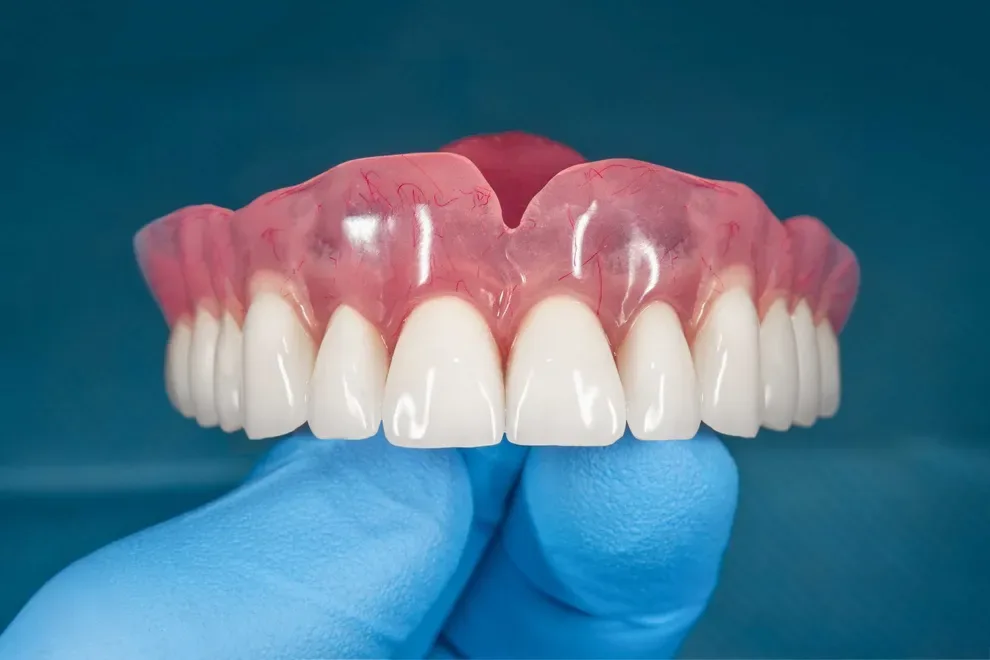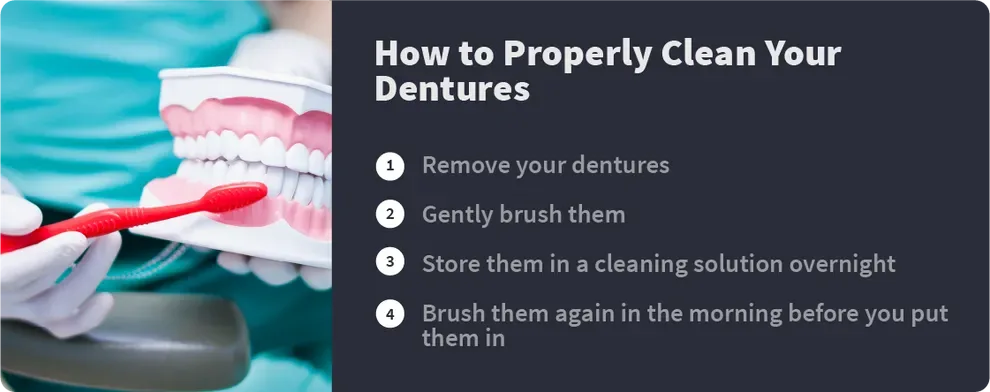How to Clean Your Dentures the Right Way

Table of Contents
- Keeping Dentures Clean
- Recommended Treatment & Cleaning
- Cleaning Your Dentures Every Day
- Home Remedies & Myths
- Dentures Are Common
- References
Removable dentures require different approaches to cleaning compared to natural teeth. Remove your dentures, gently brush them, and then store them in a cleaning solution overnight. Brush them again in the morning before you put them in.
Developing a good oral hygiene routine with dentures is simple. However, there is some misinformation about cleaning products, so it is important to listen to medical professionals’ advice.

How Do I Keep Dentures Clean?
Once dentures have been fitted to your mouth, you will receive care instructions. If dentures are permanently fixed to your jaw with dental implants, you may treat them the same as natural teeth, including brushing and flossing. Many people receive dentures that are removable, which means they need to be taken out at the end of the day and treated with special cleaner.
Your dentist can offer recommendations, and following these instructions is the best way to clean your dentures. There are also some home remedies that may support denture cleanliness, and some you should avoid.
Some sites recommend diluting household bleach, but it is best to avoid this and stick to products that are known to be safe for your mouth and your dentures.
Standard Recommended Denture Treatment & Cleaning
It is important to clean your dentures daily, just like it is important to clean natural teeth. Your dentist will recommend a basic cleaning procedure for your dentures.
Get a denture brush and gently brush them at night, or at least once per day. You can hold removable dentures over a sink with a washcloth to reduce the risk of dropping and breaking them.
Place the dentures in a clean container with a commercial denture-cleaning liquid. They will soak overnight.
Denture cleaner should only be used outside of the mouth. It should never be used like mouthwash.
Brush the dentures again in the morning before putting them in for the day.
If you run out of denture cleaning liquid, you can dilute white vinegar with water, which helps remove plaque and calculus from the dentures. Do not use full strength vinegar, as the acidity can damage your dentures.
You may also use a soft denture brush with toothpaste to clean your dentures rather than using a specific liquid denture cleanser, according to the ADA. Ask your dentist for toothpaste recommendations, as dentures are often made of resin, plastic, or ceramic. Some chemicals in toothpastes react poorly with these materials.
It is possible to use a mild soap like a hand soap to clean your dentures. Avoid harsh soaps or exfoliating scrubs.
If you take your dentures out temporarily, the American Dental Association (ADA) recommends placing dentures in room temperature water to keep them pliable and clean. Avoid hot or boiling water because that can damage or warp your dentures.
You can sometimes use denture adhesives to keep your dentures from sliding a little. If you notice they slide a lot or do not seem to fit your mouth, get in touch with your dentist to have them re-fit.
Many dentures are attached to dental implants in the mouth, which improves the fit and reduces bone loss in the jaw. Sometimes, these are permanent implants and not removable, but if they are removable, your dentist may recommend cleaning the implants underneath with a soft brush.
Cleaning Your Dentures Every Day Is Best
Another study published in 2018 examined the benefits of daily denture cleaning compared to intermittent cleaning. Although evidence for the benefits of certain cleaning routines has been examined, evidence of consistent and frequent cleaning compared to less frequent cleaning had not been reported. The study found that dentures support good oral health if they are cleaned once per day, according to your dentist’s instructions, rather than cleaned less than once per day.
Dentures will collect plaque and tartar just like natural teeth. Developing a good oral hygiene routine to maintain their cleanliness will help to keep your mouth healthy for much longer.
Home Remedies & Myths About Denture Cleaning
You may run out of denture cleanser or want to find a method of cleaning your dentures that is more natural or eco-friendly. You can ask your dentist about denture cleansers that contain natural ingredients, safe natural remedies, or eco-friendly packaging options.
It is important to avoid certain chemicals, which are touted by some online resources as ways to clean your dentures. For example, do not use household bleach to clean your dentures. This is physically harmful for you, and bleach can damage your dentures without making them whiter.
One study examined four different dentist-recommended methods for cleaning dentures: standard brushing and immersion in water, standard brushing and immersion in water with a cleansing tablet, ultrasonic brushing and immersion in water, and ultrasonic brushing and immersion in water with a cleansing tablet. The study took place over five days, and researchers examined the amount of biofilm before and after each cleaning method. They determined that a cleaning tablet in water dramatically reduced the amount of bacteria on the dentures, but the difference in brushing methods did not seem to impact the amount of bacteria or plaque on the dentures.
Dentures Are Common
You may associate dentures with older adults who have lost their teeth, but a statistic from 2020 found that 40.99 million adults in the United States have either full or partial dentures. With so many types of dentures, more people are using these dental appliances to restore their smiles.
You may receive temporary dentures, partial fixed (permanent) dentures to replace just a few teeth, or complete dentures, either fixed to dental implants or not, to fully restore your bite.
If possible, your dentist will take impressions of your existing teeth so they can make dentures that are as closely matched to your original bite as possible. This may involve different types of measurements, x-rays, and dental impressions. Your general dentist may make dentures for you or refer you to a prosthodontist for specialty treatment.
